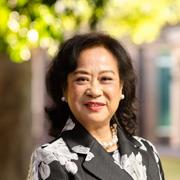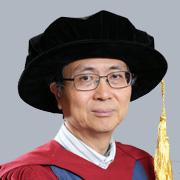
中文
In 2005, the University celebrated the inauguration of the first 8 Endowed Professorships,
a milestone in the University's history.
To date, a total of 120 Endowed Professorships have been established.
a milestone in the University's history.
To date, a total of 120 Endowed Professorships have been established.

 |
L & T Charitable Foundation Professorship in Biomedical Sciences "As residents in Hong Kong, we have enjoyed a high standard of medical service throughout our lifetimes. We are glad and proud that HKU has nurtured innumerable outstanding medical professionals. We hope all Hong Kong people will be able to continue to benefit from outstanding medical care, including that from new research results and medical discoveries. This endowment is just a beginning; together we aim to see HKU reaching new frontiers and horizons."
Mrs Rita Tong Liu and family |
 |
Huang Jian-DongAppointed in 2017 Synthetic biology is a new interdisciplinary branch of biology and engineering, and refers to the design and fabrication of biological components and systems that do not exist in the natural world. It combines various disciplines, including biotechnology, evolutionary biology, genetic engineering and computer engineering, and is used to re-design and fabricate existing biological systems for useful purposes. Medical researchers are investigating how to apply synthetic biology to design and build novel biomolecular components, and networks and pathways, and how to use these constructs to rewire and re-programme organisms. They hope these re-engineered organisms will lead to more efficient and cheaper drugs, and targeted therapies that attack superbugs and diseases such as cancer. Professor Huang Jian-Dong is a Principal Investigator at the School of Biomedical Sciences at The University of Hong Kong (HKU). Professor Huang earned his BS degree from Fudan University, Shanghai in 1988 and went to the US through the China and United States Biochemistry Examination and Application (CUSBEA) Program to pursue his PhD studies in transcriptional regulation during fruit fly embryonic pattern formation. He earned his PhD degree from the University of California, Los Angeles in 1994 and received his postdoctoral training in mouse genetics at the National Cancer Institute, NIH, Maryland in the US from 1994 to 1998. He joined the Department of Biochemistry at the LKS Faculty of Medicine, HKU in 1998 as an Assistant Professor. In 2014 he became a Professor with tenure at the Department of Biochemistry and the School of Biomedical Sciences. Professor Huang’s research is focused on the study of a highly efficient DNA engineering technology known as recombineering. He has provided experimental evidence revealing the mechanism of recombineering and improved its efficiency in both E. coli and mammalian cells. He has applied this technique to genomic studies and developed more efficient methods in DNA and chromosome engineering. Since 2008, he has been pursuing synthetic biology studies into vaccine development and cancer therapies. In his laboratory, Professor Huang is aiming to design and fabricate artificial biological parts, devices and circuits to control biological pattern formation, and to attack cancer cells and prevent infectious diseases. Professor Huang is also researching the mechanism of intracellular transportation and its roles in development, neuronal function and genetic diseases. Current research suggests that the microtubule network is used for transport over long distances while the actin network is used for short-range delivery in animal cells. He and his team are focusing on the roles of kinesin-1 in neurodegeneration. While training in the US, Professor Huang was the first to report that the two major intracellular transportation systems of mammalian cells, the microtubule- and actin-filament-based system, directly interact with each other through their motor proteins, kinesin and myosin. To help conduct his later research, he established his own laboratory, the Huang Lab, at HKU in October 1998. Professor Huang is a recipient of the Outstanding Graduate Award for Universities in Shanghai, a Fellow of the CUSBEA Program, the HKU Outstanding Young Researcher Award 2005-2006, the HKU Outstanding Research Student Supervisor Award 2011-2012, and the HKU Outstanding Researcher Award 2014-2015. He has over 120 peer-reviewed articles in respected journals such as Nature, Science, Genes and Development, Physical Review Letters and Angewandte Chemie International Edition. |